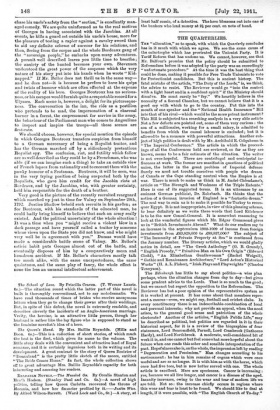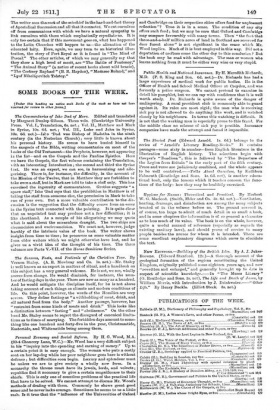THE QUARTERLIES.
THE "allocation," so to speak, with which the Quarterly concludes has in it much with which we agree. We see the same cause of the catastrophe which has prostrated the Unionist Party. It is Tariff Reform that has undone us. We cannot, however, see that Mr. Balfour's promise that the policy should be submitted to Referendum before it was adopted by the party was an exceedingly "unfortunate procedure." At the time it was tht best thing that could be done, making it possible for Free Trade Unionists to vote for Protectionist candidates. But this is ancient history. The fatal mistake of the article, "The Duty of the Lords," is, we think, the advice to resist. The Reviewer would go "into the contest with a light heart main a confident spirit" if the Ministry should dissolve. He must surely be "fey." We heartily believe in the necessity of a Second Chamber, but we cannot believe that it is a good cry with which to go to the country. Put this into the mouth of one speaker and the "National Health Insurance" Bill into that of his rival—which would be the more potent instrument? This Bill is subjected to a searching analysis in a very able article Not a few defects are pointed out, some of them very curious : the son of a millionaire, working for a small salary, is admitted to benefits from which the casual labourer is excluded ; but it is allowed to be a measure with powerful attractions. Another sub- ject of high politics is dealt with by Mr. Archibald R. Colqnhoun in "The Imperial Conference." The article in which the proceed- ings of all the Conferences held are reviewed, so far as they are known, seems to be a fair estimate of the situation. The writer is not over-hopeful. There are centrifugal and r-entripetal in- fluences at work. The former are manifest in questions of political union, the latter in the great problem of Imperial defence Surely we need not trouble ourselves with people who dream of Canada or the Cape standing neutral when the Empire is at war. There is much to make us think in M. Andre Cheradame's, article on "The Strength and Weakness of the Triple Entente." Here is one of its suggested terms. It is an utterance by an eminent German publicist, Dr. Rohrbach. He thinks that the notion of a German invasion of England is a "fantastic dream." The real way to ruin us is to make it possible for Turkey to recon- quer Egypt. It is not inappropriate, in view of this pleasing scheme, to hear definitely as we write these words that Lord Kitchener is to be the new Consul-General It is somewhat reassuring to look at the wonderful figures which Mr. Edgar Crammond gives us in "British Investments Abroad." What do our readers say to an increase in the septennium 1902-1909 of income from foreign investments from £63,828,000 to £88,837,000? The subject of "The Immunity of Private Property at Sea" is continued from the January number. The literary articles, which we would gladly notice in detail, are "The Greek Anthology" (G. B. Grundy), "English Prosody," "Primitive Man on his Own Origin" (Edward Clodd), "An Elizabethan Gentlewoman" (Rachel Weigall), "Gothic and Renaissance Architecture," "Lord Acton's Historical Works" (H. A. L. Fisher), "Irish Plays and Playwrights" (Charles Tennyson).
The Edinburgh has little to say about politics—a wise plan perhaps, when the situation changes from day to day—but gives some prudent advice to the Lords. That is so much to the good; but we cannot but regret the opposition to the Referendum. The Reviewer has but spoor opinion of the representative system as it is workel at present. It has come about that members repre- sent a caucus—even, we might say, football and cricket clubs. In every constituency there is an indescribable combination of local and personal interests ; why not provide an appeal, when the need arises, to the general good sense and patriotism of the whole electorate ? Another of the articles, "English Public Life," may be described as political, but politics are regarded in it in their historical aspect, for it is a review of the biographies of four statesmen, Lord Beaconsfield, Parnell, Lord Cranbrook (Gathorne Hardy), and Lord Northbrook. A moderate, well-considered bit of work it is, and one cannot but feel somewhat more hopeful about the future when one reads this sober and sensible interpretation of the past. Hopefulness also is, on the whole, the impression left by reading "Degeneration and Pessimism." Man changes according to his environment : he has in him remains of organs which were once useful and are so no longer. It is with him as with the horse, which once had five toes, but is now better served with one. The whole article is excellent. Here are specimens. Cancer is increasing : yes, because we all live longer, and cancer is a disease of the aged. Insanity increases, owing to the wear and tear of modern life we are told. Not so : the increase chiefly occurs in regions where this wear and tear is least to be found. We should like to deal at length, if it were possible, with "The English Church of To-day."
The writer sees thereat of the mischief in the hard-and-fast theory of Apostolical Succession and all that it connotei. We cut ourselves off from communions with which we have a natural sympathy to link ourselves with those which emphatically repudiate us. It is only too certain that if this movement goes on, what has happened to the Latin Churches will happen to us—the alienation of the educated laity. Here, again, we may tarn to an historical illus- tration, the story of Port Royal as it is found in "The Mind of Pascal." The other articles, of which we may generally say that they show a high level of merit, are "The Battle of Fontenoy," "The Animal Story" (a notice of recent books about wild beasts), "The Cockney Raphael" (B. R. Hayden), "Madame Roland," and "Lyof Niko16yeviteli Tolstoy."







































 Previous page
Previous page